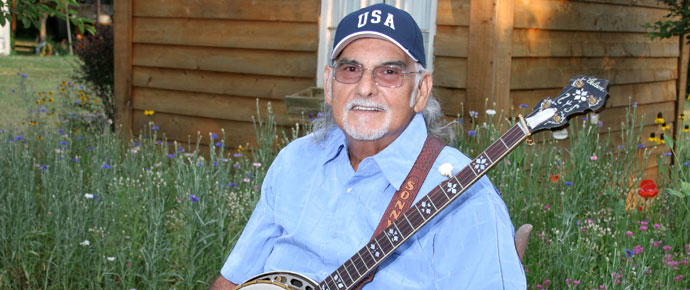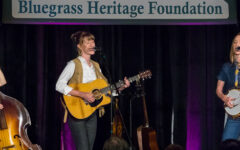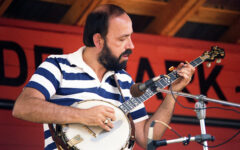
Ask Sonny Anything is a recurring feature where our readers pose questions to the great Sonny Osborne, one half of the iconic Osborne Brothers who redefined bluegrass music in the 1960s, and noted banjo maven and collector of fine prewar instruments. Everyone is encouraged to pose queries of your own each week in the comments, about his history in the music, his wealth of banjo knowledge, or regarding any life advice you might be needing.
Given your mixed feelings (emotions) about Jimmy Martin, can you listen to the music you recorded together and hear how good it is? There are some current groups that been recording for years and have not recorded a single song as good as your work with Jimmy (in my opinion). Thanks as as always for answering these questions. By the way, if I lived near you, I would happily drive you and your better half anywhere you need to.
James P.
Thank you, James, for your time. I really appreciate it. And I also want to thank you for your offer to drive me and what’s-her-name anywhere we wanted to go. That’s really strong, and I know it, so thank you for that.
You asked about Jimmy Martin and whether or not I could listen to the records we made in 1954. They were on RCA and we did 6 sides. But before that, Bobby and Jimmy made some records for KING that go unheralded, and they shouldn’t. They were recorded in Cincinnati about 1950 or ’51 and had Curly Ray Cline playing fiddle, and Charlie Cline playing banjo… excuse me, playing AT banjo (sorry Charlie). And I don’t know who played bass. Those records were really good, especially the vocals. Bobby and Jimmy sang together as well as two people, who were not brothers.
Now back to Osborne Brothers and Jimmy Martin in 1954. When Jimmy was in the hospital, he sent for me to come and visit and, because of past history, originally I balked. But after I sat and thought about it, Jimmy was pretty sick and I realized that he might not come back. So I went. And it was kinda funny because when I got to the hospital, Jimmy was lying in bed and he immediately cleared the room.
I thought that it was so like Jimmy Martin to do just that. And after everyone left, he looked up and said, “Sonny, I love you and Bob. We made some of the best bluegrass music that was ever made,” and we laughed a little bit and we cried a little bit and we talked about 1954 and how it was. And we talked about the good times and the bad times and there was a lot of bad times.
And it was obvious that Jimmy didn’t want to talk about the bad times but they were still in my mind. About how relentless he was about telling me how to play the banjo as opposed to how I was going to play the banjo, and how our association ended one night in Pontiac, MI when before the show he told Bobby our names wouldn’t be on the next records.
Bobby came straight and told me. When Jimmy came into the dressing room, I confronted him with what he had said. And he said, that’s right, your name won’t be on the next records. And I told him that as far as we were concerned, then there wouldn’t be any more records. And 2 weeks from today, we won’t be in Detroit. That’s what happened. There were no more RCA records for Jimmy nor us, and we immediately went to work for Charlie Bailey at WWVA in Wheeling in August of 1955. We stayed there until Christmas, and in April 1956 our first MGM record of Ruby, Are You Man came out.
From that point, I know our history but it doesn’t keep me from thinking and wondering what would have happened had we stayed together with Jimmy, because … and not to sound conceited or big-headed … the Brothers and Jimmy were the best of the best.
Case closed.
S
—–
One of my most favorite groups of all time was the Country Gentlemen. Did the Brothers work with them much, and what were your thoughts on their progressive style?
Tim L.
Tim L. thank you for your participation. Without you guys, this wouldn’t work.
Speaking of the Country Gentlemen, one of my very best friends is Bill Emerson, and he was in the original group as one of the founders. I really liked what they did, but then when he left, they took on a ‘them against us’ attitude, which I didn’t understand at the time and I don’t now. It kinda remained that way and still I never understood why.
You mentioned their progressive style…well what was progressive about it? I never could figure that out. With their attitude change, it was more aggressive than progressive. I realize that what I’ve said here will hurt some feelings and create some resentment, but I’m just telling you how it was from my point of view.
I want to tell you a story. We were on Decca Records and I got them, the Country Gentlemen, an appointment with Owen Bradley hopefully to get them signed with Decca. So, in the meeting, which I attended, Charlie was the spokesman for the Gentlemen, and he mentioned their fan base. Owen asked him to explain what he had said about a fan base…. Like, how many?…Like, what number are we looking at? Like 350 or 15,000? Charlie didn’t have an answer and that was the end of the conversation.
So attitude, Nashville, Decca recording contract……..floated out the window on the air created when Owen stood up indicating the meeting was over.
One other thing to prove there was no anything on our part…. Once we were doing a date at the American Legion Park in Culpeper, VA and the Jets were also there that day. They were on and I couldn’t tell you who their members were at the time, other than Doyle Lawson. They sang a religious-type song and it was so good. I asked Doyle who sang the high part and he said it was him. I loved that song and, as of this day, I couldn’t tell you the title.
Doyle just got back to me and told me the whole thing. Thank you brother Doyle. … Song title was Lord Don’t Leave Me Here .. members were Bill Yates, lead .. Charlie Waller, bass .. Bill Holden, baritone .. and brother Doyle Lawson, tenor. That was as good as it gets. I stood out beside a tree and it hurt, it was so good.
S
—–
Sonny,
Lots of folks have mixed feelings about the IBMA. Some love it, others don’t. I’m curious what you think about it, and perhaps more importantly, is bluegrass music better off with such an organization or not? If you were 21 and touring, would you be a member, and what would you expect in return?
Carl P.
Carl. Good to hear from you. The IBMA (International Bluegrass Music Association)…
I can’t tell you much about the organization itself, except for the Trust Fund. I worked like you wouldn’t believe, almost to the begging stage, for the IBMA to have a Fund to help bluegrass people who were in need. I had been on a Country Music Trust Fund board for 11 years, and I saw it as a really good and necessary part of IBMA. I couldn’t understand, even to this day, why I had to convince them. They voted to do it and it is one of the really good parts of IBMA.
Now, I must be straight with you all…you asked me for an answer and I’ll give it to you as I see it. Whether IBMA is a good thing, I can’t tell you. I was doing pretty good before it existed, and I did pretty good after it became a reality. Money-wise I couldn’t see any more or less, before or after.
Dates? We worked about 200 a year before, and 200 a year after. Now don’t come at me with “you only worked 179 in this year and 193 in this….!” I’m talking in general, and those reading this who are smart enough will have already realized that. When IBMA has the get-together once a year and the awards show, etc etc .. well, that’s a good thing, isn’t it? It is.
Bobby and I were honored one year on the 50th anniversary of Rocky Top. They had all those banjo players, mandolin players, guitar players, bass men and women… I don’t know what her name was but one lady didn’t have any shoes on. Doyle Lawson stood beside me and played that great rhythm. I think I told him how much I missed that. That was a good thing. Right? Wasn’t it?
So, all things considered, I guess IBMA is a good thing.
S
—–
Sonny, this is going to be a hard question. I think. If you could only choose one song (okay, if you really insist make it two) to share with us, which summarizes the Osborne Brothers sound for someone who has never heard the band perform, what would it (they) be?
Bret W.
Bret. Thanks for taking the time. You all ask me questions…if you didn’t do that, I’d have to say Sayonara.
Rocky Top and Pathway of Teardrops. I choose them because in my mind, that is some of the best we can do. Notice I said ‘some of the best … not ‘the best’ … because there are so many of those I wouldn’t know what to say. (Now that’s strange within itself)
I would like to also add Never Grow Old, Ruby, Up This Hill and Down, Nearer My God, When the Grass Grows Over You …. see? It doesn’t end.
Then to pick just 2 or 3 out of about 1,000 songs we recorded…I just can’t do it. That’s the best I can do.
S
If you have something you would like to ask Sonny, be sure to post it in the comments below, or send it to us directly.







